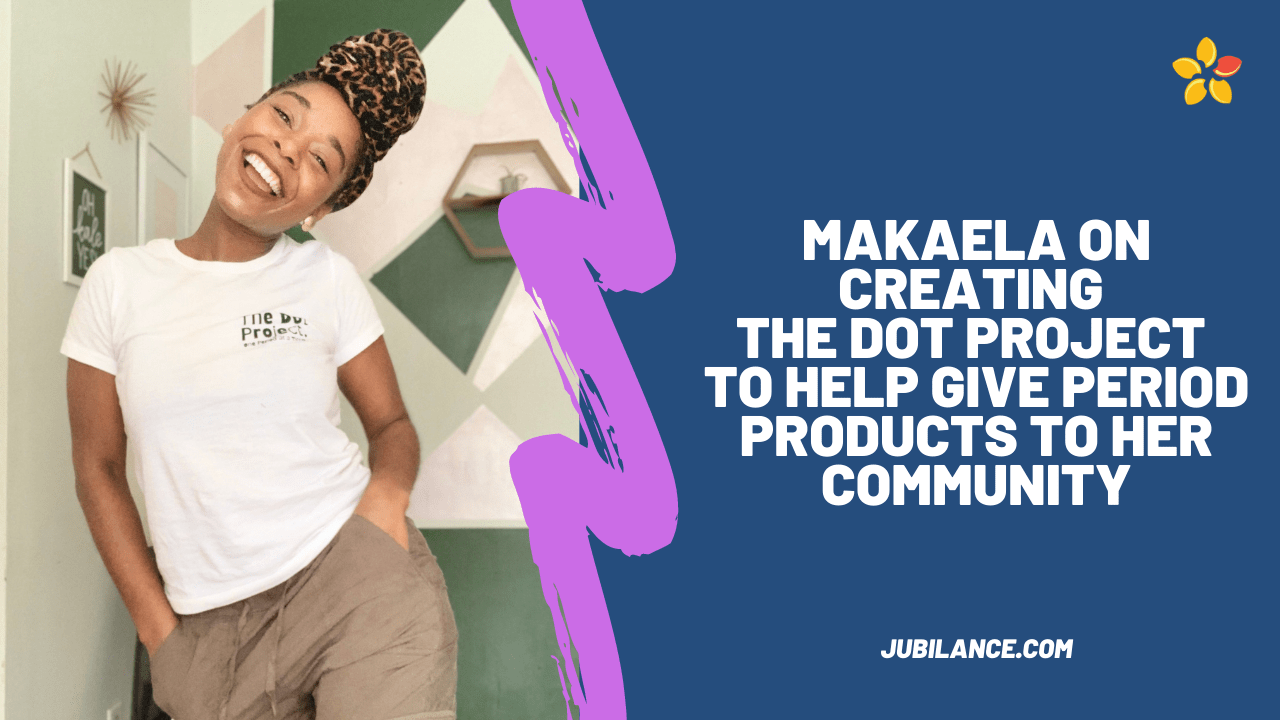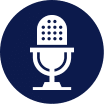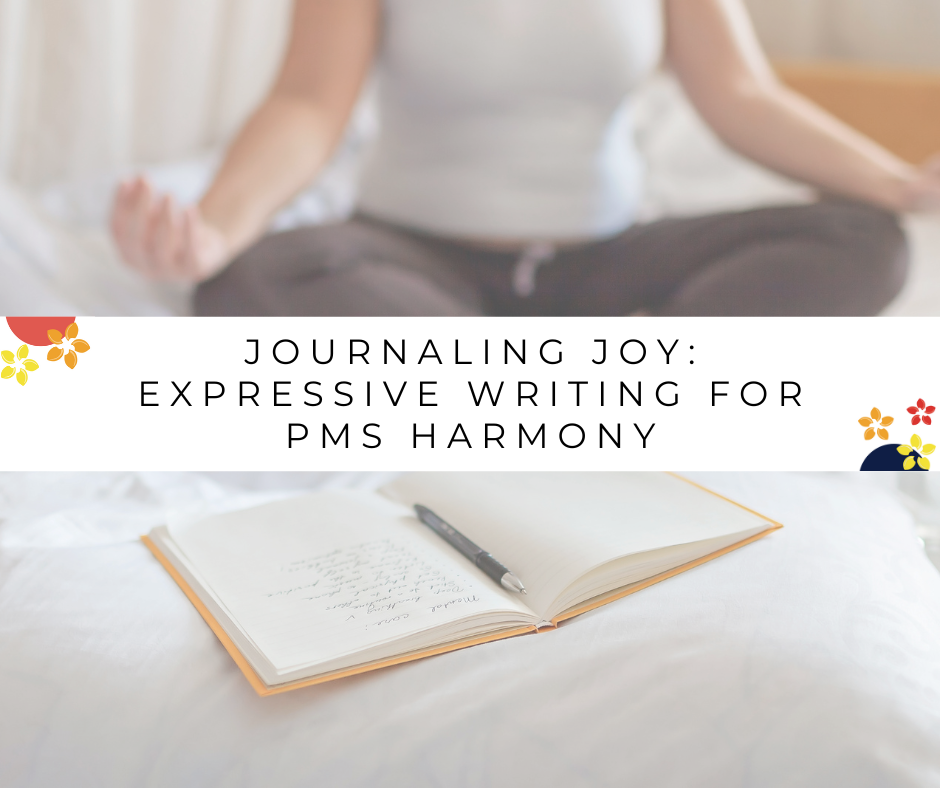Today we have a great line up for you, we’re chatting with the amazing Makaela Stallworth, who started The Dot Project, an organization Providing access to menstrual care through education and self-love advocacy one period at a time in Baltimore!
Watch her interview:
Listen to her interview:
Read her interview:
Alice: I just want to say thank you so much for being on Makaela. We’re so excited to have you and to learn more about The Dot Project.
Makaela: Yes. Thank you so much for having me on here, Alice.
Alice: Yay! Can you talk a little bit about The Dot Project? We’re just about to get into it? What is it?
Makaela: Yes. So The Dot Project, we are based here in Baltimore, Maryland and like any other menstrual organization, we provide period products to different shelters, homes, directly to homes. We just started giving donations to schools and then also be go directly out into the homeless community and hand out period products.
And then also what we’re trying to add is a educational component, it saysThe Dot Project because I don’t think there’s a proper introduction to the period, okay, this is what it is, this is what your body is going through, you’re going to experience this. This is what you’re going to use for your period. I didn’t have what I would want to have an introduction to my period. So we want to be able to just create that space for young women menstruators.
Even for mature menstruators who may not know what their body is going through and how they can help their bodies while they’re on their periods. And so we just want to be able to create that component as far as education in schools and then also we want to create a little pamphlet or little booklet. Just so to make it fun for young menstruators as an introduction to their periods. So that’s who we are.
Alice: Wow, that’s awesome. That would be so helpful. I know when my period happened it was just, what is going on? You know what will happen, but it’s so different and our bodies change and I love that you can provide that education to women.
Makaela: Yes, we are trying to. And even to people like dads, or moms, or anybody who may not know, or want to help somebody, a young menstruator to be able to help them understand. We wanted to be for everybody. Honestly, I feel like everybody needs to know what a period is, what we go through.
Alice: Yeah. That’s great. How did you get started with this? How did you come to decide to create The Dot Project?
Makaela: So of course, I’m a woman. So I’m a menstruator. Growing up, I don’t have the introduction that I will want to have to periods and I was fortunate enough to be able to have access to the products that I needed, whenever I needed them when I was coming in my period. But just over the last couple of years, it’s been funny because me and my aunt we have shared, oh my goodness, here is this new period product. Should we try it out?
And she has younger daughters. So we’re, okay we needed to become masters of these period products so when they get a little older we can help them out. And then just over the last couple years being here in Baltimore just noticing a large homeless community here and it is a lot of people who don’t have the access to the products and just looking back where I’m from and whoa, I was raised a little bit fortunate than others.
And wow, just noticing, oh my gosh my neighbors are people that I sat in the classroom with, may not have had access to the products as I would have. And so my research just seemed like, how I can help and what others are doing and oh my gosh, they have other organizations other menstrual organization. I don’t think they have anything like that here in Baltimore.
Oh my gosh, we will be creating something. So The Dot Project was birthed in the pandemic. [crosstalk] I gear[?] it from, I would say a couple of days ago is when I first started up so June. Yeah. So we’re one year in.
Alice: Oh, my gosh, that’s amazing.
Makaela: Yes. So we started during the pandemic and just out of a need and necessity for the community here and just me wanted to provide and see what I can do. Because like I said, I’m a menstruator and I know I’ve been through that struggle of, oh my gosh, I’m in the bathroom, I don’t have a tampon, I don’t have a pad. But it some people that’s their everyday reality. So it’s no way, we need to do something about this and I want to do something that anything that I can do to help.
Alice: That’s amazing, Makaela. Oh my gosh. And we were talking about this a little bit before we jumped into the podcast, but you started a period pantry. So for everyone who’s listening and kind of looks like one of those little libraries that you can see in people’s yards where you open a little door, you grab a book, but for Makaela she created a place where women can just go grab period products. Can you talk a little bit about creating that? What was the impetus? That’s amazing. Everyone should have these.
Makaela: what I was thinking. I think my inspiration came from again, those little libraries that you see in people’s yards are in the community. But also it’s a neighborhood out here. I can’t even think of the neighborhood, but I was just strolling down the street and they have one of those [inaudible] it was a pantry, people can put non-perishable food in there.
I think they were putting toiletries, detergent just people in that neighborhood, who [crosstalk] have or need the products, they were able to go up into it. And this is in the beginning when I was starting The Dot Project, oh my goodness, can this happen with period products, strictly period products? I know people have out here, they have a lot of community fridges again like that pantry in the neighborhood or a lot of the little libraries.
But no, we need something specifically for period products and period products only. So okay, we need to get on it. Get on it. So yes, actually a year in the making, and we just put it up in April down here, Baltimore, and a prominent area where a lot of the homeless community are, and a lot of people in that community are in need, but we’re willing and wanting to put it in all different neighborhoods here, and elsewhere. But yes, we love it.
Alice: Yes, bring it to New York. That’s where I’m from.
Makaela: Oh my goodness, yes.
Alice: Everyone needs that and everyone’s experience that time, oh my God, I don’t have a tampon right now. But like you said that the homeless population, that’s their reality that they’re living with. Can you talk a little bit about period poverty for our listeners if they don’t have any background on this at all? What is that?
Makaela: Period poverty, just to sum it up, it’s people not having the adequate access that they need to the products for their periods. And then also in conjunction with not having proper waste management and then hygiene, not being able to cleanse themselves. And so it affects any and everybody, it affects your neighbors, it affects people that you wouldn’t even think that it does.
Just because I feel like it goes hand in hand with the government and them not setting us up for success for us to be able to go throughout everyday life without having to worry where we’re going to get our next tampon or, how we’re going to be for our next period. And period poverty also goes like in conjunction with a tampon tax or I think in some places they call it the pink tax.
Which is there are certain products in the store. I don’t know if people know this, but there are certain products in the store. I don’t know, like gum, or just random stuff is not taxed in certain states, but tampons and period products, anything period related are taxed. And so I believe it’s 19 states out of the 50 don’t have the tampon tax or period tax. And I think Maryland is one of them. So that’s awesome [crosstalk].
Yeah. And so I think it’s a few more states that we so are fighting for, a couple of organizations are on Capitol Hill working with their local legislators, just to be able to bring that to the floor. Bring that to the lawmakers and the bill writers, just be able to bring light to that, this is an issue we shouldn’t have to pay tax on things that we need on a regular basis that we can’t control. That it’s nature, it’s out of our control what our body does.
And so hey, that should not be taxed and that’s not fair and it should honestly, I feel it should be free. It should be free. Like why not?
Alice: I know, like in Scotland it’s free. They [crosstalk] have tampons in the bathrooms. Can you imagine? That would be amazing.
Makaela: Oh my goodness. Yes, it is. Yes or even if it’s not free if somebody is in need, just going to a store and I don’t know some way somehow be able to receive free products. Because they shouldn’t have to go through. Yes, it’s a blessing that we do have organizations like The Dot Project, or we have Happy Period or Bloody Bitches in their cities doing the work. But I feel it should be at a larger scale, it should. Free products, free products. Brave[?] enough.
Alice: Yes. So Makaela, what can our listeners do? If they want to get involved with this and their community, what should they be doing?
Makaela: I don’t know, I just say how I started, I just would go to the store or whatever period products I had leftover and just make little period packs and take them out into the community not necessarily doesn’t have to be like the homeless community. But any neighbors that you know who don’t have the access to the products, or if you just leave them in a place if you guys have a little library, that’s maybe not the best place to put it. But just a way to start.
And then also, just looking to if there are any local chapters of already established menstrual organizations or if you have the capacity just to be able to start one in your community, I feel like is a great way to start or also just donating to the local shelters. A lot of like the more independent or the little work[?] organizations that support the community in need. I feel is a great way just to be able to support and help your community.
Alice: Yeah. Oh, that’s awesome, Makaela. Thank you so much. Yeah, I think that gives us a bunch of different examples of how people can help. So thank you.
Makaela: Yes, in any way.
Alice: Yeah. And so the thing that we always ask on this podcast is, what is your definition of womanhood?
Makaela: Oh, that’s a so good question. Wow, I feel mine would be two words. It’d be, one would be powerful, because and I say this all the time, without people, without women, without people who can reproduce. The world wouldn’t go around, you guys wouldn’t be here. We do hold the power in our hands, and in our bodies, and our bodies go through so much and we’re still able to carry on in life and do what we need to do while going through what we go through while menstruating. And then also I would say my second word would probably be softness. Because yes we are able to be powerful and be strong and have the strength to carry on, and then also we can still have a softer side, we’re able to still be little cuddly bears.
Alice: Yeah.
Makaela: And we hold that space for ourselves. So we emotional and feel[?] our feels while we still are being superwomen or super people.
Alice: Yeah, that makes sense. We are superwomen.
Makaela: We are.
Alice: Yeah. We can carry things as you said, carrying that power and able to have all of our menstruation issues. I don’t know if men could do it. Could they [crosstalk] menstruate? I don’t think so.
Makaela: I really don’t know. I feel they will all call out of work. It would just shut[?] the world down for the whole week if they would have a period as well.
Alice: Yeah. Amazing, amazing.
Makaela: Yeah. They can’t do it. So I’m glad we were the ones to be chosen to have the period.
Alice: Yes. That’s amazing. Yeah. Shut down the world.
Makaela: Yeah. We would probably have to, seriously.
Alice: Yeah. And on a different note. What have you been up to during the pandemic? So you started The Dot Project, what else have you been up to in Baltimore? I mean the world is kind of opening up. Are you getting back out there?
Makaela: Yes, I will say I am. I work a lot, my normal day job. But during the pandemic, I was literally at parks just outside hanging out grilling just enjoying the outside. Luckily it was during this summer so we were able to hang outside. But now things are starting to open up a little bit. So I’m looking forward to traveling. I love going to concerts and festivals. So I’m excited and looking forward to go into that. Now that they’re coming back. I’m ready.
Alice: Do you have a concert planned already?
Makaela: Yes. So it’s ahead of time, so I just got tickets to go to Coachella. It’s on my bucket list. I just absolutely have to go. Yes.
Alice: That’s so cool.
Makaela: Very excited, yes. And here in Baltimore, they do little festivals during the summer and stuff, so I’m pretty sure I’ll be there.
Alice: Oh, that’s awesome. Wow, a Coachella is the big one, that would be so fun.
Makaela: So live it up.
Alice: Yeah. And Makaela, how can listeners find out more about The Dot Project?
Makaela: Yeah. So the mainstream social media that we use is Instagram. So our name or whatever you want to call it is @-t-h-e-_-d-o-t-p-r-o-j-e-c-t, so the_dotproject. And through that, you can click on our link tree which is in our bio, and its ways for you to be able to donate monetarily. To sign up if you need products to be given to you or somebody that you know, and also we have a good few playlists that we’ve put together.
Alice: Awesome!
Makaela: Yes. So that’s our main way, I think you can also email us and contact us through that. If you are an organization and you want to partner with us, or if you are a business, we always are looking for people that be able to put donation boxes in their local businesses just to be able to support us and their communities. So that’s probably the best way to get in contact with us.
Alice: Oh, that’s awesome. Perfect. And Makaela is there anything else you’d like to add to our listeners today?
Makaela: I would say, I don’t know. Just keep being awesome. Just keep being awesome.
Alice: That sounds great. Perfect. Well, it was so great to have you on Makaela. Thank you for being here.
Makaela: Thank you so much again for having me and reaching out. We’re so excited.








